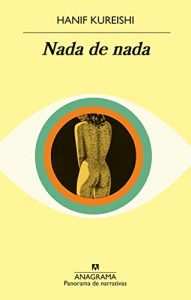Perhaps there is a trick to living from this of literature without perishing in the attempt (of course based on the fact that the writer or writer on duty is good). In case of Hanif Kureishi It is that of the writer who broke into the novel with force from his initial dedication as a screenwriter and found that necessary point of success.
What point of success is necessary? Well, that of a great initial novel like "The Buddha of the Suburbs", of worldwide repercussion but not so groundbreaking as to brand the author with fire.
But of course, that no longer depends on oneself. In fact, Kureishi himself would surely have sold his soul to the devil in exchange for an impact on the level of world classics such as "The Perfume" of Patrick Süskind or "The Catcher in the Rye" by JD Salinger.
And yet, in the end, he was able to continue writing more novels without the heavy slab of the imperishable book, with the right measure of recognition but without the burden of immediate comparison with the above, exposing the miseries of those who are incapable of repeating deeds.
This is how Kureishi survived himself, let go of the sinister temptation of death for resounding success, and pursued new and juicy novels.
Hanif Kureishi's Top 3 Recommended Novels
The Buddha of the Suburbs
Cities come to life thanks to writers or filmmakers. Otherwise, they would be just an alienating mixture of concrete and artificial light. Kureishi recreated a very special London in this novel, turning it into all kinds of intellectual, moral, sexual and any other concerns you can imagine.
"My name is Karim Amir and I am English through and through, almost." Thus begins The Buddha of the Suburbs, the novel that, twenty-five years ago, triumphantly inaugurated the career of one of the essential British writers of recent decades.
The Buddha in question is Karim's father, a respectable middle-class and middle-aged Pakistani married to an Englishwoman, who one fine day decides to give housewives and their husbands in the suburbs the ration of transcendence and mystical ecstasy to which everyone believed they were entitled in the seventies. The adolescent Karim tolerates the ravings of his elders with youthful cynicism.
Isn't he always looking for fun, sex and answers to the most diverse questions in life? But everything will soon get out of hand and Karim will see the doors open to launch into "real life" in that magical cauldron of feminism, sexual promiscuity, theater, drugs and rock and roll that was the multiracial and fascinating London of the seventies. , during the end of the hippy era and the dawn of punk; an ecosystem portrayed with extraordinary liveliness and realism by an author who gave a fictional character to themes and tones that at that time were exotic, if not unpublished: themes about the diversity of races and classes in a new world, portrayed with a mixture always unpredictable of humor and acidity, perversity and affection.
An author who was as pioneering as he was influential, who was read by his literary heirs with an insistent question running through their heads: "How could this Kureishi know so much about us, who was born in South London and was twenty years older than us?" Or that is what Zadie Smith says in the enthusiastic and enlightening prologue that accompanies this rescue, which contains a happy observation: "Rereading Kureishi now I feel the same emotion, I feel the same pleasure, and all of it slightly intensified." With this reissue in Another Turn of the Screw, today's reader has the opportunity to see how accurate his words are.
Nothing at all
Everything must go through the necessary filter of humor. The tragedy that we experience sometimes needs that compensation that makes us revisit our own future with the right measure of peremptory. But beyond that fleetingness of everything to laugh at, there is one of the strangest humors.
It is the most acidic and cruel comic vis. Time is finite on stage and in the last acts we watch undaunted as everything breaks down, the stage falls, we forget the script and we contemplate an already empty stalls. Laugh then right?
Waldo, a notorious filmmaker who has known glory, awards and applause from critics and audiences, now remains in a wheelchair due to the ailments of his advanced age. However, his libido remains intact, and his wife, Zee - an Indian married to a Pakistani and with two daughters, whom he seduced during a filming and brought to London - agrees to his requests to undress before him and show him her parts intimate.
The third vertex of the triangle in the center of this novel is occupied by Eddie, film critic, admirer of Waldo and now lover of Zee under the nose of the old director. This spy on the couple, documents their suspicions and plans his revenge with the occasional help of Anita, actress and friend, ready to investigate Eddie's troubled and gruesome past ...
In this short novel, Kureishi explores the misfortunes of old age and physical decrepitude, sordid marital and sexual conflicts, and the secret mechanisms of artistic creativity. And he does so by unleashing his rogue humor and pornographic and eschatological touches. Result: a forceful and wild novel, that handles with exemplary balance the mixture of the disgusting situations with the heartbreaking pathos of the characters.
Laughter and desolation as ingredients of a visceral inquiry into the miseries and chimeras of contemporary life, through a love triangle that overflows with lust, hatred, resentment, pettiness, debauchery, lewdness and other excesses. A very black and fierce tragicomedy that will not leave any reader indifferent.
The last word
Biography no but mirror yes. The writer never has glory, if anything the bare applause of a well-attended presentation. So Kureishi constructs the protagonist of this novel with that complete openness of the creator always determined, at some point in his naturally egocentric creative career, to end up writing something about himself. This is how one can earn some narrative glory, transcendence, intimate applause.
Mamoon Azam is a sacred monster, an old literary glory who has already written his great works and is a consecrated author, but whose sales are decreasing. And without those sales, it is difficult for him to maintain the house in the English countryside that he shares with his current wife, Liana, an Italian with character and a lot less years than him, whom he met and fell in love with in a bookstore.
Liana, in agreement with the young and unbridled editor of Mamoon and his reluctant approval, hatches a plan to improve family finances: commissioning a biography that will serve to revitalize her figure in the literary market. But the life of this consecrated Indian writer who came to the metropolis as a young man to study and decided to become a perfect British gentleman is not without its rugged aspects.
Before Liana there have been two other important women in his life, whom in both cases he destroyed: Peggy, his first wife, who died bitter and ill, and Marion, his American lover, whom he subjected to sexual practices, at the very least. , heterodox when not directly humiliating.
All this is investigated by his biographer, the young Harry Johnson, through letters, diaries and interviews with Mamoon himself and with people who knew him, including Marion. But ghosts and tensions not only emerge from the past, because Harry's girlfriend, Alice, spends a few days with him at Mamoon's house and the old writer develops a peculiar relationship with her.
And meanwhile Liana suffers bouts of jealousy, Harry gets involved with a house maid and the biographer elicits information from the biographer about his sexual voracity, his crazy mother and other shady aspects of his life.
And thus, between the old writer and the young apprentice a dangerous game of manipulation and seduction is established in this novel that speaks of desire, guilt, lust, inner demons, couple relationships, sexual and sentimental fantasies, and the power - sometimes fearful - of words.



